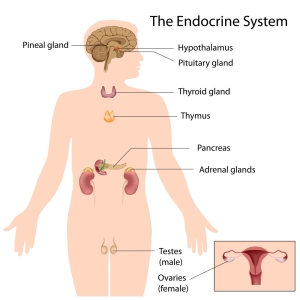Treatment of delirium involves close monitoring of the vital signs and support of the metabolism while removing toxins that may be underlying the condition.
Here are two examples
1. For instance, consider a 25-year old man who is a known diabetic who has just finished a strenuous 3 hour hike without taking the time to have a snack. He had taken the normal morning insulin dose, and blood tests now confirmed low blood sugar (hypoglycemia).
This patient will likely recover very quickly from his delirium following glucose injections and a carbohydrate meal.
2. On the other hand an elderly woman who was picked up by police for jaywalking and was noted to be in a delirium, was found to be extremely hypothyroid when blood tests were taken. Her thyroid gland does not produce enough thyroid hormone and she will need to take replacement thyroid hormones for the rest of her life. In her case a few days of thyroid replacement are needed for the thyroid hormones to work and for her delirium to respond. However, this woman will be able to leave the hospital on thyroid hormone replacement, when her delirium had disappeared.
Treatment is directed against the underlying cause. Infection has to be treated with antibiotics, brain lesions may have to take time to heal in case of a stroke. On the other hand fast action may be needed in the case of an ischemic stroke where swift treatment with tissue plasminogen activator may be able to reopen a clogged artery and allow normal blood flow again to the affected brain area.
Every situation has to be treated individually and appropriately.
Drugs used to treat delirium
The psychiatrist will use a number of different drugs to control difficult situations where a psychiatric condition is the reason for the delirium. As these patients are usually in the elderly age group the function of the kidneys and liver as the major drug eliminiation organs is slowed down compared to earlier in life. According to Dr. Marie Geizer (assistant professor of psychiatry at UBC, Ref. 16) this means that the physician has to be more careful about the dosages used. Going “low and slow” is the guiding principle. It is best to use one medication at a time. Here are a few comments regarding some of the more common psychotropic drugs used.
Drugs used for delirium treatment
| Name of drug: | Effect on the patient: |
| Neuroleptic drugs (haloperidol, loxapine, riperidone, chlorpromazine etc.) | Used for acute psychosis with destructive behavior for rapid tranquilization. *SE: muscle rigidity, tardive dyskinesia |
| Anticonvulsants (carbamazepine, gabapentin) | Used for toning down agression. SE: falls, sedation |
| Benzodiazepines (alprazolan, chlordiazepoxide,oxazepam, lorazepam) | The shorter acting ones are better as they do not accumulate as much. SE: confusion, falls, sedation, urinary incontinence. |
| Antidepressants (trazodone, fluoxetine, paroxetine, venlaflaxine, etc.) | For depression. SE: drug interactions have to be watched for, cardiotoxic side effects also |
| *SE = side-effect |
These are only a few examples of the more frequently used drugs in the elderly who are having delirium problems. Benzodiazepines are the most abused drugs by the nursing personnel. The doctor will often leave a “prn dose” for benzodiazepines in case of agitation. The nurse is then entitled to use his/her own judgement in administering this drug when it seems indicated. However, when several of these doses are administered, withdrawal symptoms may present as “agitation” and this may be treated again with more benzodiazepines. The patient, particularly when frail, may get oversedated, fall and fracture a hip. This happens not infrequently in nursing homes, not with the intent to do so, but it happens nevertheless.
Treatment without the use of drugs
Geriatricians (physicians who specialize in the medical needs of the elderly) tell us that one should always attempt to use non-drug methods to treat symptoms first. Agitation can often be tackled by isolating the patient in a quiet room with soothing background music. Family can get more involved including grandchildren, when it is safe to do so. This social interaction changes the scene. Walking with the patient to “abreact” anger and frustrations can be helpful. It may require more staffing, which goes against the movement to cut back hospital budgets…
Detoxification
Books like “Breakthrough” (Ref.17) by Suzanne Somers have reviewed newer insights of antiaging medicine. This points out the importance of detoxifying the body from heavy metals like mercury, lead and cadmium. Many cases of delirium or dementia may in part be due to heavy metal poisoning. Hormone levels should be carefully checked to ensure that they are in balance.
When detoxification has been done, it is important to build up the metabolism by nutritional supplements.
References:
1. OL Lopez et al. Neurology 2000 Dec 55(12):1863-1869.
2. K Yasojima et al. Brain Res 2000 DEC 887(1):80-89.
3. A Kontush et al. FreeRadicBiol Med2001Jan30(1): 119-128.
4. H Vanderstichele et al. Amyloid 2000Dec7(4):245-258.
5. Neely et al. Lipids 2000 Nov35(11):1249-1257.
6. RA Yokel Neurotoxicology 2000 Oct21(5):813-828.
7. Petanceska et al. Exp Gerontol 2000 Dec 35 (9-10):1317-1325.
8. MB Liddell et al. Brit J Psychiatry 2001 Jan 178: 7-11.
9. Sramek et al.ExpertOpinInvestigDrugs2000Apr9(4):899-915.
10.K Kosaka et al. Neuropathology 2000 March 20(1): 1-7.
11.V Haroutunian et al.Arch Neurol 2000 Aug57(8):1145-1150.
12. C Puckett et al. Am J Hum Genet 1991Aug49(2):320-329.
13. M Haltia Ann Med 2000 Oct 32(7): 439-500.
14. Ferri: Ferri’s Clinical Advisor: Instant Diagnosis and Treatment, 2004 ed., Copyright © 2004 Mosby, Inc.
15. Rakel: Conn’s Current Therapy 2004, 56th ed., Copyright © 2004 Elsevier
16. The 50th Annual St. Paul’s Hospital Continuing Medical Education Conference for Primary Physicians, Nov. 16 – 19, 2004
17. Suzanne Somers: “Breakthrough” Eight Steps to Wellness– Life-altering Secrets from Today’s Cutting-edge Doctors”, Crown Publishers, 2008







